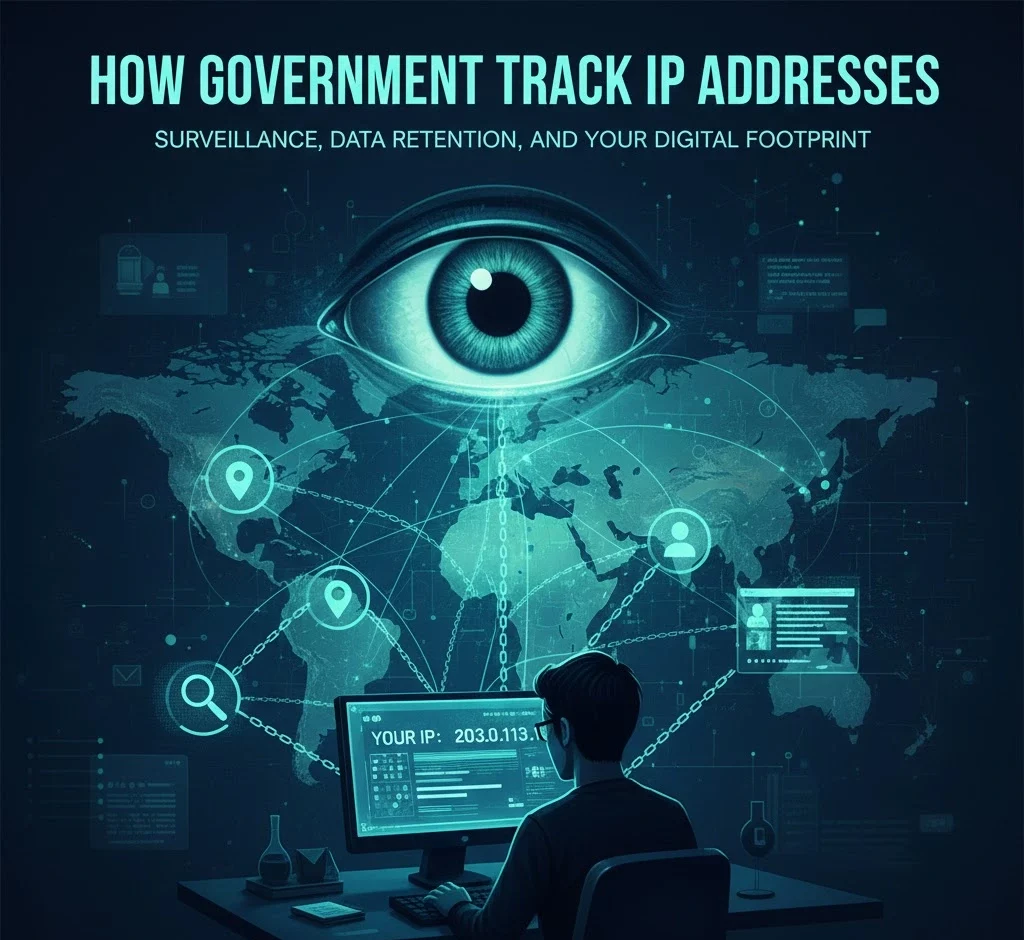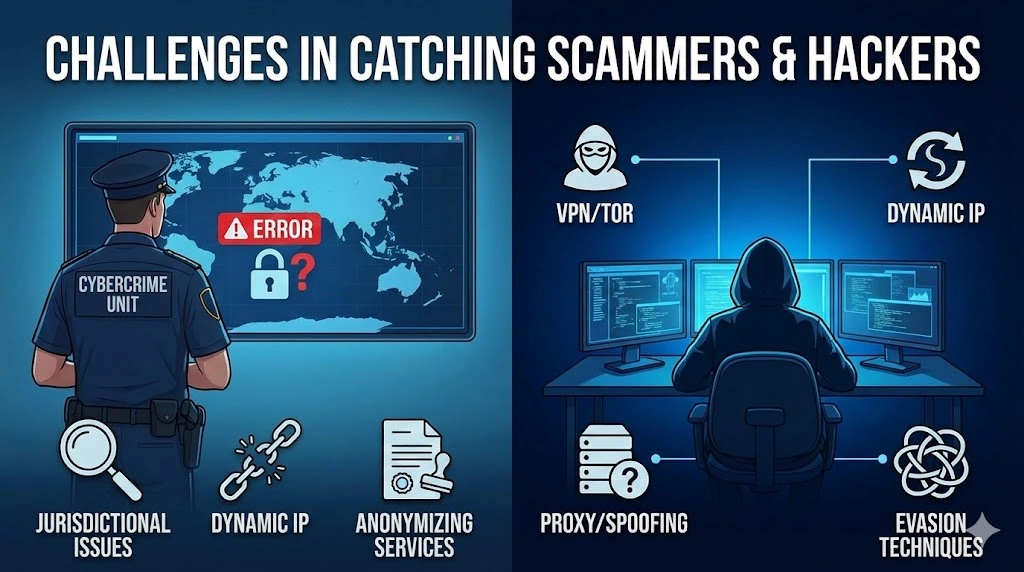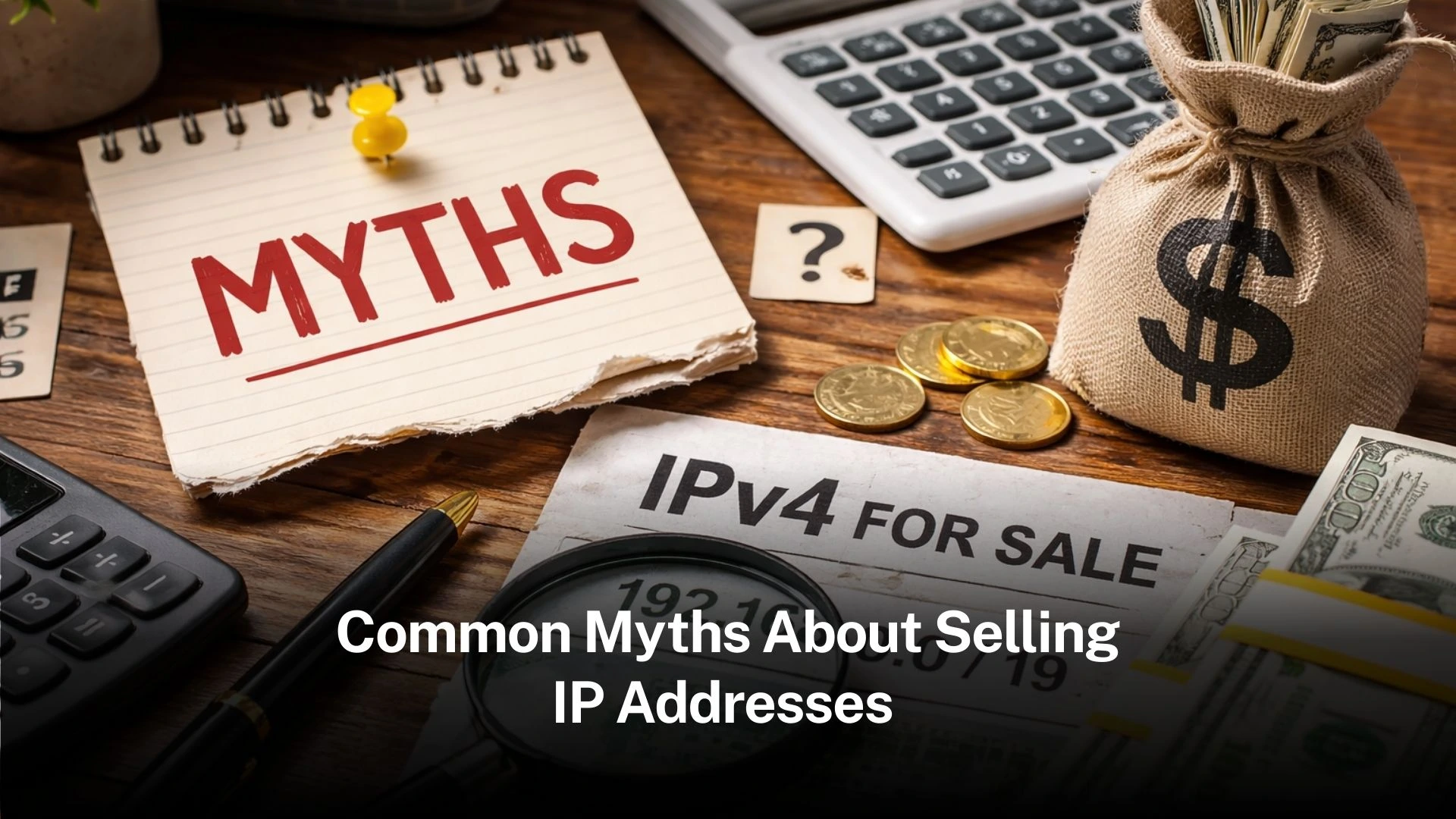How does the government track down people using their IP addresses?

Queries: How does the government track down people using their IP addresses? Why is it difficult for them to catch scammers and hackers?
Table of Contents
IP addresses serve as unique identifiers for internet users, enabling connectivity and interaction. Governments and law enforcement agencies utilize these digital signatures to track down individuals involved in illegal online activities.
However, capturing scammers and hackers isn’t as straightforward as it might seem. Despite the sophisticated technology at their disposal, authorities often find themselves playing a high-stakes game of digital hide-and-seek. This is due to the advanced evasion techniques employed by cybercriminals, the transient nature of IP addresses, and the complex, borderless realm of cyberspace.
In this article, we’ll explore how IP tracking is used by governments and why, despite these efforts, scammers and hackers often remain one step ahead.
Internet Protocol Addresses

Every device connected to the internet is identified by a unique number known as an IP (Internet Protocol) address. This digital identifier is crucial not only for everyday communications but also for law enforcement agencies that need to track down individuals involved in illegal online activities. However, the task of catching cybercriminals like scammers and hackers is fraught with challenges, despite the sophisticated tools at the disposal of governments. Here’s a closer look at how governments use IP addresses for tracking and why catching cybercriminals remains a complex issue.
How Governments Track Individuals Through IP Addresses
Governments and law enforcement agencies can trace digital activities back to specific IP addresses through various means. One of the primary methods involves cooperation with Internet Service Providers (ISPs). ISPs typically maintain detailed logs that link IP addresses to their customers’ accounts. When suspicious activities are detected, authorities can request these logs under legal mandates, which allow them to identify the individual associated with a particular IP address at a given time.
Additionally, governments often collaborate with online platforms such as social media sites, email providers, and other digital services. These platforms can provide valuable logs that detail the IP addresses used to access particular accounts or conduct specific actions online. This data can be instrumental in piecing together a suspect’s online presence and activities.
Challenges in Catching Scammers and Hackers

Despite the ability to track IP addresses, several significant obstacles make it difficult for authorities to apprehend cybercriminals:
Use of Anonymizing Services
Many scammers and hackers use VPNs (Virtual Private Networks), proxies, and services like Tor to mask their IP addresses. These tools can hide the user’s real IP address and make it appear as if they are operating from a different location, often in a completely different part of the world.
Dynamic IP Addresses
Many ISPs assign dynamic IP addresses, which change periodically. This variability can make it challenging to pinpoint who had access to a specific IP address at any given time without accurate logs from the ISP.
International Jurisdictional Issues
Cybercrime often transcends borders, with criminals operating from one country while committing crimes in another. This global nature of the internet creates significant legal and practical challenges in cooperation between different countries’ law enforcement agencies.
Advanced Evasion Techniques
Hackers often employ sophisticated methods to avoid detection, including spoofing IP addresses or using compromised systems as proxies for their attacks. This not only obscures their trail but also complicates the legal process of tracking and prosecuting them.
Moving Forward
Addressing the challenges of tracking cybercriminals requires international cooperation and consistent advancements in cybersecurity technology. Law enforcement agencies must also keep pace with the rapidly evolving techniques used by criminals. Additionally, there’s a growing need for legislation that addresses the unique challenges posed by digital crime and ensures that ISPs and other online platforms cooperate fully with investigations.
In conclusion, while the tracking of individuals through IP addresses is a powerful tool for law enforcement, the complexities of the digital age offer unprecedented challenges that require innovative solutions. As cybercrime continues to evolve, so too must the strategies to combat it, ensuring a safer online environment for all users.
Trusted IPv4 Leasing for Business Growth
Get enterprise-grade IPv4 space quickly, with seamless deployment and end-to-end management.
Get Started with i.leaseFAQs
Does "Incognito Mode" hide my activity from the government?
No. Incognito (or Private) mode only prevents your browser from saving your history on your specific device. Your Internet Service Provider (ISP) can still see every website you visit, and they can be legally compelled to share those logs with government agencies.
How long do ISPs keep IP address logs?
Data retention laws vary by country. In the US, ISPs typically retain IP assignment logs for 6 months to 2 years. In the EU, retention periods are strictly regulated but still exist for law enforcement purposes. These logs are the primary link between an IP address and a subscriber’s identity.
Can the government track me through the Tor Browser?
Tor is much harder to track than a standard VPN because it bounces traffic through three different volunteer nodes. However, government agencies (like the NSA or FBI) have developed sophisticated techniques (such as “Traffic Correlation” or compromising exit nodes) to de-anonymize users in high-profile criminal investigations.
Related Posts

Inbound vs. Outbound IPv4 Leasing: A Complete Guide for Enterprises
Understanding IPv4 leasing helps enterprises manage scarce address space, reducing risk and unlocking strategic growth opportunities in today’s digital economy. Key points Distinguishes between inbound (leasing in) and outbound (leasing out) IPv4 approaches and their strategic implications. Highlights contract structures, registry risk management and continuity considerations affecting global number resources. Inbound vs. outbound IPv4 leasing: complete enterprise guide In the post-exhaustion era of Internet Protocol version 4 (IPv4),Read more Related Posts Inbound vs. Outbound IPv4 Leasing: A Complete Guide for Enterprises Understanding IPv4 leasing helps enterprises manage scarce address space, reducing risk and unlocking strategic growth opportunities in today’s digital economy. Key Read more Common Myths About Selling IP Addresses The IPv4 secondary market is often shrouded in mystery, leading many organizations to sit on valuable digital assets because they Read more How to turn idle IPv4 addresses into a recurring revenue stream with iLease Unlock the hidden value of unused IPv4 addresses with iLease, turning dormant digital infrastructure into a recurring revenue stream while Read more .related-post {} .related-post .post-list { text-align: left; } .related-post .post-list .item { margin: 5px; padding: 10px; } .related-post .headline { font-size: 18px !important; color: #999999 !important; } .related-post .post-list .item .post_thumb { max-height: 220px; margin: 10px 0px; padding: 0px; display: block; } .related-post .post-list .item .post_title { font-size: 16px; color: #3f3f3f; margin: 10px 0px; padding: 0px; display: block; text-decoration: none; } .related-post .post-list .item .post_excerpt { font-size: 13px; color: #3f3f3f; margin: 10px 0px; padding: 0px; display: block; text-decoration: none; } @media only screen and (min-width: 1024px) { .related-post .post-list .item { width: 30%; } } @media only screen and (min-width: 768px) and (max-width: 1023px) { .related-post .post-list .item { width: 90%; } } @media only screen and (min-width: 0px) and (max-width: 767px) { .related-post .post-list .item { width: 90%; } }

Common Myths About Selling IP Addresses
The IPv4 secondary market is often shrouded in mystery, leading many organizations to sit on valuable digital assets because they fear the perceived complexity or legal “gray areas.” As IPv4 exhaustion becomes a permanent reality, the value of these addresses has skyrocketed, yet misconceptions continue to stall potential transactions. At i.lease, powered by the real-world expertise of LARUS, we’ve seen how these myths prevent companies from unlocking significant capital.Read more Related Posts Inbound vs. Outbound IPv4 Leasing: A Complete Guide for Enterprises Understanding IPv4 leasing helps enterprises manage scarce address space, reducing risk and unlocking strategic growth opportunities in today’s digital economy. Key Read more Common Myths About Selling IP Addresses The IPv4 secondary market is often shrouded in mystery, leading many organizations to sit on valuable digital assets because they Read more How to turn idle IPv4 addresses into a recurring revenue stream with iLease Unlock the hidden value of unused IPv4 addresses with iLease, turning dormant digital infrastructure into a recurring revenue stream while Read more .related-post {} .related-post .post-list { text-align: left; } .related-post .post-list .item { margin: 5px; padding: 10px; } .related-post .headline { font-size: 18px !important; color: #999999 !important; } .related-post .post-list .item .post_thumb { max-height: 220px; margin: 10px 0px; padding: 0px; display: block; } .related-post .post-list .item .post_title { font-size: 16px; color: #3f3f3f; margin: 10px 0px; padding: 0px; display: block; text-decoration: none; } .related-post .post-list .item .post_excerpt { font-size: 13px; color: #3f3f3f; margin: 10px 0px; padding: 0px; display: block; text-decoration: none; } @media only screen and (min-width: 1024px) { .related-post .post-list .item { width: 30%; } } @media only screen and (min-width: 768px) and (max-width: 1023px) { .related-post .post-list .item { width: 90%; } } @media only screen and (min-width: 0px) and (max-width: 767px) { .related-post .post-list .item { width: 90%; } }

How to buy IPv4 addresses through a certified IP broker
Buying IPv4 space requires policy compliance, verified need, and registry approval, making certified IP brokers essential guides through complex global transfers. IPv4 transactions are regulated transfers, not simple purchases — registries must approve documentation, justification and registration changes. Certified brokers reduce risk and delay by aligning buyers with registry policy, routing legitimacy and cross-region requirements. Why companies still need to buy IPv4 addresses The global supply of IPv4 addressesRead more Related Posts Inbound vs. Outbound IPv4 Leasing: A Complete Guide for Enterprises Understanding IPv4 leasing helps enterprises manage scarce address space, reducing risk and unlocking strategic growth opportunities in today’s digital economy. Key Read more Common Myths About Selling IP Addresses The IPv4 secondary market is often shrouded in mystery, leading many organizations to sit on valuable digital assets because they Read more How to turn idle IPv4 addresses into a recurring revenue stream with iLease Unlock the hidden value of unused IPv4 addresses with iLease, turning dormant digital infrastructure into a recurring revenue stream while Read more .related-post {} .related-post .post-list { text-align: left; } .related-post .post-list .item { margin: 5px; padding: 10px; } .related-post .headline { font-size: 18px !important; color: #999999 !important; } .related-post .post-list .item .post_thumb { max-height: 220px; margin: 10px 0px; padding: 0px; display: block; } .related-post .post-list .item .post_title { font-size: 16px; color: #3f3f3f; margin: 10px 0px; padding: 0px; display: block; text-decoration: none; } .related-post .post-list .item .post_excerpt { font-size: 13px; color: #3f3f3f; margin: 10px 0px; padding: 0px; display: block; text-decoration: none; } @media only screen and (min-width: 1024px) { .related-post .post-list .item { width: 30%; } } @media only screen and (min-width: 768px) and (max-width: 1023px) { .related-post .post-list .item { width: 90%; } } @media only screen and (min-width: 0px) and (max-width: 767px) { .related-post .post-list .item { width: 90%; } }